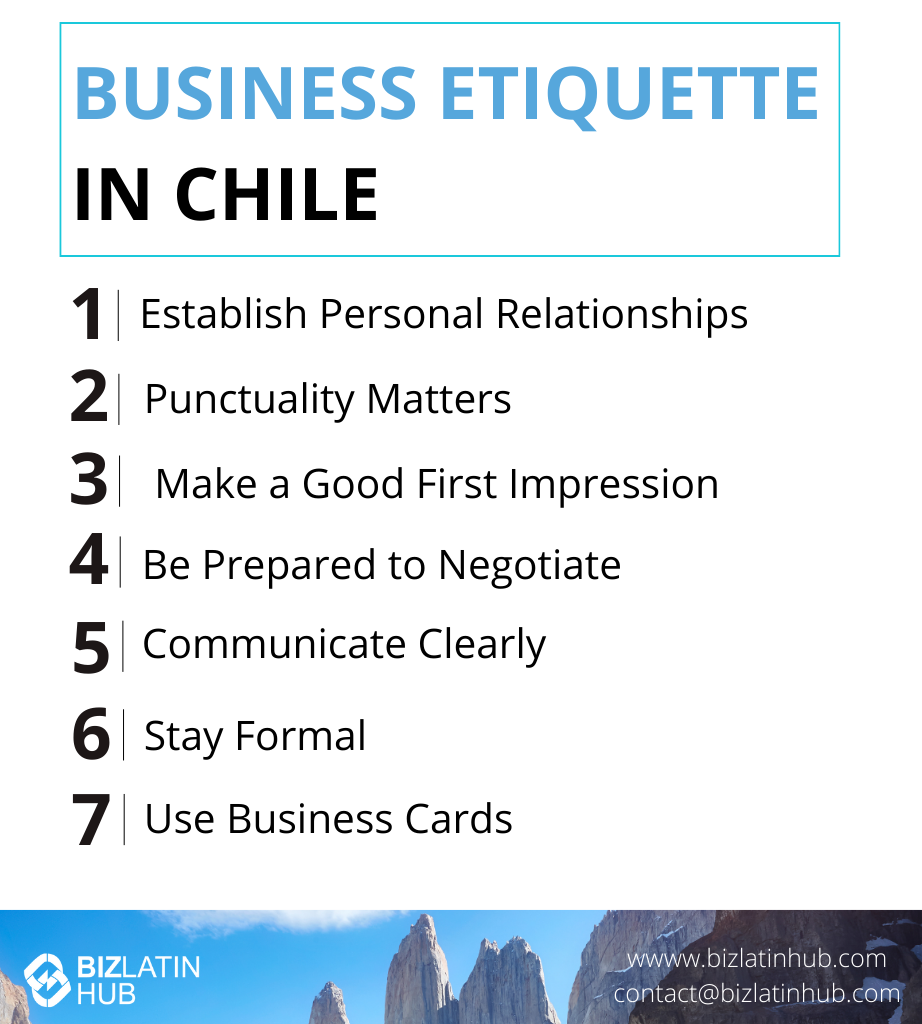Success in global business depends on understanding cultural differences. Chile presents a distinct mix of old traditions and new ways. Professionals benefit from learning Chile’s specific business etiquette. This knowledge helps build strong relationships and makes business talks better.
Chilean business culture highly values personal ties and respect for authority. Communication in Chile uses subtle spoken words and body language. Professionals who understand these points can interact well. They can also negotiate with ease.
This article explains important parts of Chilean business customs. It gives information on dress codes, ways to communicate, meeting rules, and cultural habits. Professionals who learn and use these practices can create good relationships. They can also achieve success with setting up a company in Chile.
With offices in Santiago and years of experience advising clients in Chile, Biz Latin Hub provides practical insight into the nuances of local business etiquette.

Understanding Chilean Business Culture
Chilean business culture stresses personal relationships and trust. First meetings usually involve getting to know people. Business talk often waits. Being on time shows respect and professionalism. Therefore, punctuality is important. Senior managers often make decisions in Chile. Executives are important as business connections grow. Formality is key. People use proper titles and respect authority. Sharing meals and “sobremesa” (after-dinner talks) strengthen business bonds. These practices build a solid base for good business connections in Chile.
The Importance of Personal Relationships
Developing personal relationships is very important in Chilean business. These connections often form before major deals happen. Initial meetings focus on building trust. People usually do not discuss business right away. Respecting personal honor and the hierarchy is vital. Introductions and connections are very useful in business negotiations. Chileans appreciate informal talks about family or sports. These talks help build strong personal bonds. In Chile, these personal relationships, called “pitutos,” help with networking. They also help in making business deals. This cultural point shows the high value of personal connections and trust in business.
Hierarchy and Respect in the Workplace
Chilean businesses have clear hierarchies. People deeply respect authority, seniority, and titles. Senior members often lead meetings. Their insights are valued. Employees show respect to managers and senior leaders. Decisions usually come from the top levels of management. Managers in Chile are seen as figures of authority. They direct work with a clear approach.
Collaboration is increasing. However, a directive management style is still common. Respect for hierarchy is important for gaining trust. Acknowledging the experience of senior members also helps. Small actions like nods or saying “yes” show respect. These actions help build your credibility in Chilean business settings. Chilean companies often have a vertical hierarchy. Respect for seniority and rank is expected. Final decisions are typically made by top-level executives, and meetings may include junior staff only for observation.
Formality in Addressing Colleagues
Addressing colleagues with proper titles is important in Chilean business. Formal communication demonstrates respect. It also helps build credibility. Decisions often come from higher levels. This reflects the workplace hierarchy. Employees usually show deference to managers and senior leaders. Business communication is formal. However, a little appropriate humor is welcome. Titles and correct forms of address maintain structure in Chilean business. Understanding and respecting these formalities helps create successful interactions in Chile’s professional environment. This aspect of communication highlights the need for respect and proper behavior in business relationships.

Communication Styles in Chile
Chilean business communication requires patience and understanding. People appreciate simple gestures that acknowledge decisions. A nod or a spoken “yes” works well. Chileans often speak with emotion. They avoid direct criticism to protect others’ dignity. Humor is welcome in discussions if it remains suitable. A polychronic work style is common. This means people manage multiple tasks. They may switch topics smoothly.
Building personal relationships is very important for business success in Chile. These relationships are locally known as “buen pituto.” These elements create a unique Chilean communication style. Use formal titles and surnames in initial meetings. Men shake hands firmly; women may exchange a cheek kiss depending on familiarity. Wait to be invited before using first names.
Chileans may communicate indirectly. Politeness is highly valued, and critique should be delivered with diplomacy. Rather than saying ‘no’ directly, someone might say ‘we’ll see’ or ‘let me think about it’ to soften a rejection.
Verbal Communication: Language and Titles
Using formal titles in business is standard in Chile. Use first names only when someone invites you to do so. Emails usually start with “Estimado” (for men) or “Estimada” (for women). They include titles and last names to show respect. Chileans try to avoid confrontation in their communication. They prefer indirect ways to protect the dignity of others. Using “usted” (formal you) is more appropriate than “tú” (informal you) in professional settings. Many Chilean executives understand English. However, speaking Spanish is always valued. This shows respect. It also shows a willingness to embrace local culture in business.
Non-verbal Cues: Gestures and Body Language
Non-verbal cues are significant in Chilean business settings. Understanding these cues helps build good relations with business partners.
| Cue/Gesture | Interpretation in Chile | Recommendation/Note |
| Nodding | Agreement or acknowledgment | Common and positive. |
| Thumbs Up | Approval or “okay” | Generally understood and positive. |
| Maintaining Eye Contact | Trust, confidence, sincerity | Important, but avoid staring. |
| Staring | Can be seen as aggressive or challenging | Maintain natural eye contact. |
| Crossing Arms | Defensive, closed-off | Avoid this posture during discussions. |
| Close Personal Proximity | Normal, reflects cultural warmth | A pat on the back or standing close is typical. |
Hand gestures like nodding and giving a thumbs up often show agreement or approval. Maintaining eye contact is important. It conveys trust and confidence. However, staring can seem aggressive. Avoid crossing your arms during discussions. This can look defensive. Standing close to someone or a pat on the back is typical. This reflects Chile’s cultural norms for personal space.
Importance of Listening and Understanding
To build successful business relationships in Chile, respect cultural norms. Initial meetings usually focus on building relationships. Formal discussions happen later. Communication is a mix of directness and politeness. This ensures people feel considered. Develop a personal relationship with potential business partners. This is very important before making big deals. This approach shows the relationship-focused nature of business in Chile. Decision-making is often centralized. Listen carefully to understand the hierarchy. This understanding is very helpful for business talks and interactions.
Business Meetings and Protocol
Business meetings in Chile show the culture’s focus on respect and professionalism. Punctuality is important. Both parties should aim to be on time. Dress codes are formal. Men wear suits and ties. Women wear elegant, conservative clothing. These appearances show respect and professionalism. Exchanging business cards is common when meetings start. Have one side of your card in Spanish. This shows cultural awareness.
Use formal titles with surnames in greetings. Do this unless someone asks you to use first names. Relationships and trust are vital in Chilean business. So, decisions often take time. Meetings should be scheduled well in advance and reconfirmed a day prior.
Punctuality and Time Management
In Chile, punctuality demonstrates respect and reliability. Attending business meetings on time is important. This is especially true when meeting senior members. Punctuality is highly valued. You should always aim to be on time. You might see some flexibility among locals. However, as a foreign professional, strict punctuality is expected. It shows respect.
While punctuality is appreciated, the host may arrive a few minutes late. Initial meetings often focus on establishing rapport. Business discussions typically begin after some small talk, often related to family, recent events, or culture. Meetings usually start at the planned time. This is different from social events, which may start later. Typical business hours in Chile are from 9 am to 6 pm or 7 pm. Meetings scheduled in these hours usually start promptly. Good time management shows professionalism. It also honors everyone’s time.
Structuring Meetings: Agendas and Formalities
Chilean meetings often begin with personal conversations. People might talk about family or soccer. These talks build trust. They also ease everyone into the meeting agenda. Punctuality is expected. However, some attendees might arrive a little late. Hierarchical structures influence how meetings are run. Decisions mainly come from higher-level managers. Address people with their proper titles and surnames. Continue this until they allow you to use first names. This shows respect for cultural formalities. Exchanging business cards at the start of a meeting is standard. Offering a card with a Spanish-translated side shows cultural understanding.
Professional Discussions and Negotiations
In Chilean business, discussions and negotiations depend on relationship-building. Patience is very important. Quick decisions are uncommon. Initial meetings often focus on personal connection, not immediate business deals. Building trust with senior people prepares for effective negotiations. Recognizing leadership and respecting hierarchy improves your credibility. Diplomacy is key during discussions. Avoid open criticism and aggressive behavior. Instead, use a respectful and considerate tone. This helps achieve a productive result.
Dress Codes and Professional Appearance
In Chile, business attire is formal. It reflects respect for hierarchy. Following formal dress codes is common in professional settings. This emphasizes professionalism and proper conduct. Dressing appropriately creates a good impression. It also helps business interactions succeed.
Business dress is conservative. Men typically wear dark suits and ties; women should wear understated business attire. This is particularly important in industries like finance, law, and government affairs. Santiago tends to be more formal than regional cities—when in doubt, err on the side of overdressing.
| Category | Typical Attire | Key Considerations |
|---|---|---|
| Men | Suits (often navy blue) and ties. Jackets are important. | Conservative. Bow ties are generally not common. Formality may be less strict in rural/industrial areas but a professional look is still vital. |
| Women | Conservative suits or dresses. | Skirt hems should be at or below the knee. Attire should be elegant and conservative. |
Men usually wear suits and ties. Navy blue is a popular color. Women select conservative suits or dresses. Skirt hems are at the knee or longer. Outside of big cities, business attire might be slightly less formal. However, keeping a professional appearance is still very important.
Men’s Business Attire Standards
Men in Chile wear conservative business clothes. Suits and ties are standard. Navy blue is a common color choice. Jackets are important. Men wear them in and out of the office, even in warm weather. Bow ties are not typical in Chilean business settings. Dress rules may be more relaxed in country areas or industrial sectors. Still, a formal appearance is key. This shows the value of professional presentation in Chilean business culture.
Adapting to Different Business Settings
Building business relationships in Chile requires time. Initial meetings serve to establish trust and connection. People prefer indirect communication to maintain harmony. However, directness can be valued for clarity. Respect for hierarchy is very important. People observe formal titles. Chileans also have a polychronic work style. They handle multiple tasks and topics at the same time. Personal talks, like discussing family or interests, are common. These help create a trusting business environment. Making genuine connections can lead to good professional partnerships.
Gift-Giving in Business
Gift-giving has a special role in Chilean business culture. It can strengthen partnerships and build good relations. It is not required, but it shows goodwill. Giving gifts can add a personal touch to business interactions. Understanding gift-giving customs improves business relationships in Chile.
Cultural Significance of Gift-Giving
Gift-giving is a respected tradition in Chilean business. It shows the value of personal relationships. Thoughtful gifts express care and appreciation. These actions are not required. However, they can improve connections. They show sincerity in business deals. This practice helps build trust. Such trust is very important in Chilean culture.
Appropriate Gifts for Business Occasions
Choosing the right gift is important. Knowing what is appropriate can create a very positive impression.
| Aspect of Gifting | Guideline/Examples |
|---|---|
| Recommended Gifts | Unique items from your home country, quality wine, chocolates. |
| Presentation | Gifts should be nicely wrapped. This shows thoughtfulness and respect. |
| Gifts to Avoid | Items with negative meanings (e.g., yellow roses, sharp objects like knives or scissors). |
Chileans value unique items from your country. Quality products like wine or chocolates are also good choices. Presentation is important. Gifts should be wrapped nicely. This shows thoughtfulness and respect. Avoid gifts that might have negative meanings. Examples include yellow roses or sharp objects.
How and When to Present Gifts
The timing and method of gift-giving are important. In Chile, people open gifts when they receive them. This immediate acknowledgment is appreciated. If invited to a home, bring sweets, chocolates, or wine. Sending flowers before you arrive is good etiquette. Gifts should be presented well to show respect.

Cultural Norms and Traditions
Understanding cultural norms in Chile is vital for business success. Chilean business culture values relationships and trust highly. Decisions often result from continued interaction. Respect for authority is important. Senior members have a key role in making decisions. In communication, Chileans use Spanish and value politeness. They avoid direct confrontations. Punctuality shows respect. However, negotiations take time. Chilean business practices are relationship-focused. People build familiarity and trust before major business deals. Initial meetings focus on making these personal connections.
Important Local Holidays and Their Impact
Public holidays in Chile greatly affect business operations. Be aware of these holidays when planning business in Chile.
| Holiday | Typical Date/Period | Impact on Business Operations |
| New Year’s Day | January 1st | Businesses close. |
| Good Friday | Variable (e.g., April 18th in 2025) | Business activities pause. |
| Holy Saturday | Variable (e.g., April 19th in 2025) | Closures similar to Good Friday. |
| Labour Day | May 1st | Most businesses and offices close. |
| Chilean Navy Day | May 21st | Commemorates naval history; affects normal business schedules. |
On New Year’s Day (January 1st), businesses close. Good Friday (e.g., April 18th in 2025) also means paused business. Holy Saturday (e.g., April 19th in 2025) has similar closures. Labour Day on May 1st is another key holiday. Most businesses close on this day. Chilean Navy Day on May 21st remembers naval history. It affects normal business schedules. Remember these holidays for planning business in Chile.
Dining Etiquette and Social Gatherings
Dining in Chile is formal. It has many etiquette rules. Wait for someone to show you to your seat. It is polite to start eating after the host begins. Use utensils even for foods you might eat by hand elsewhere. Complimenting the cook is appreciated. Hosts take pride in their cooking. Participate in “sobremesa.” This is a conversation after meals. It shows politeness and interest. Leaving right after the meal is not customary.
Following these customs shows respect for Chilean culture. It also improves personal relationships. Lunch is the most common meal for business meetings. Dinners are reserved for closer relationships. If invited to a home, bring a gift such as fine wine or sweets. Wait to be shown your seat and begin eating only after the host does. Business topics are generally discussed after the meal begins unless the host initiates sooner.
Balancing Tradition with Modern Business Practices
Business in Chile is traditional and formal. Understanding unwritten rules is very important in this setting. Hierarchical structures are common in interactions. Trust and real relationships help balance tradition with modern ways. Effective communication is important, despite the formality. Understanding different cultures and shared interests can strengthen communication.
Business dealings are serious. However, people appreciate light humor. Non-confrontational communication helps maintain proper conduct. When mixing tradition with new methods, Chilean businesses often prefer careful strategies. They favor careful thought and group agreement. This ensures long-term partnerships.
Succeeding in Chilean Business Environment
To succeed in the Chilean business environment, respect traditional values. Also, understand unique social customs. Successful work together often depends on building real relationships through shared activities. These activities could be meals or sports events. Such social interactions improve professional connection and communication. Trust is the foundation of business practices in Chile. The culture tends to avoid uncertainty.
So, third-party introductions can reduce doubt. This reliance on relationships shows the importance of personal contacts in business processes. Effective communication is vital in Chilean business etiquette. This includes using Spanish phrases, making direct eye contact, and having a well-groomed appearance.
Summary of Key Etiquette Practices
In Chile, building genuine relationships and trust is basic. This often involves sharing coffee or having light talks before discussing business. Respecting authority is very important in Chilean business culture. Use proper titles. Show deference to senior members. Punctuality is key.
Being on time for meetings shows respect and professionalism. Exchanging business cards at the first meeting is standard. However, quick business decisions are rare. This reflects Chile’s conservative business culture. Meal etiquette includes “sobremesa,” a post-meal talk. Leaving immediately after a meal can seem rude.
Building Long-term Professional Relationships
Building real relationships is very important in Chile’s business culture. Trust forms the base for successful long-term partnerships. In Chile, trust often grows from shared experiences and personal connections. This is important because people can be naturally cautious about risks. Initial business meetings in Chile focus on relationship-building. Decisions are not usually made right away.
Personal connections, known as “pitutos,” create more business opportunities. These connections make interactions more productive. Non-business talks help form strong professional bonds. Examples include sharing coffee or discussing common interests.
Embracing Continuous Cultural Learning
Chilean business culture centers on personal relationships and trust. This shows its relationship-driven nature. Respect for hierarchy is vital in Chilean businesses. Senior members often make decisions. Effective communication uses polite and direct language. This maintains harmony during interactions. Punctuality for meetings is important in Chile’s business etiquette. It shows respect and professionalism. “Sobremesa” is an important cultural tradition. This after-meal conversation helps build relationships. Using such practices helps in understanding and adapting to Chilean cultural norms.
Frequently Asked Questions
1. Is Chilean business culture formal?
Yes, business culture in Chile is relatively formal. Titles, conservative dress, and respectful greetings are expected during professional interactions. Informality develops only after trust has been built.
2. How should I dress for meetings in Chile?
Dark business suits and ties for men and tailored, modest outfits for women are standard. This is especially true in sectors like finance, law, or corporate services, and in Santiago, where expectations for professionalism are highest.
3. Is punctuality important in Chile?
Yes. Being on time is a sign of professionalism. While a short delay by the host is tolerated, foreign visitors should aim to arrive punctually and reconfirm appointments in advance.
4. How do Chileans communicate in business?
Communication tends to be diplomatic and indirect. Feedback is delivered with care, and confrontation is avoided. Understanding tone and reading between the lines is important.
5. Who makes decisions in Chilean companies?
Senior executives usually make final decisions. Although mid-level staff may attend meetings, they often don’t have decision-making authority. Respect for hierarchy is important.
6. Are business meals common in Chile?
Yes. Lunch meetings are common for first or second interactions. Dinners are reserved for more established relationships. Expect polite small talk before any business matters are addressed.
7. How important is punctuality in Chilean business culture?
Punctuality is highly valued in Chilean business. Being on time shows respect and professionalism, especially when meeting senior leaders. Although some locals may be flexible, foreign professionals are expected to be punctual at all times.
8. What types of gifts are appropriate in Chilean business?
Thoughtful gifts like wine, chocolates, or items from your home country are appropriate in Chilean business. Gifts should be nicely wrapped and presented in person. Avoid items with negative connotations, such as yellow roses or sharp objects.






